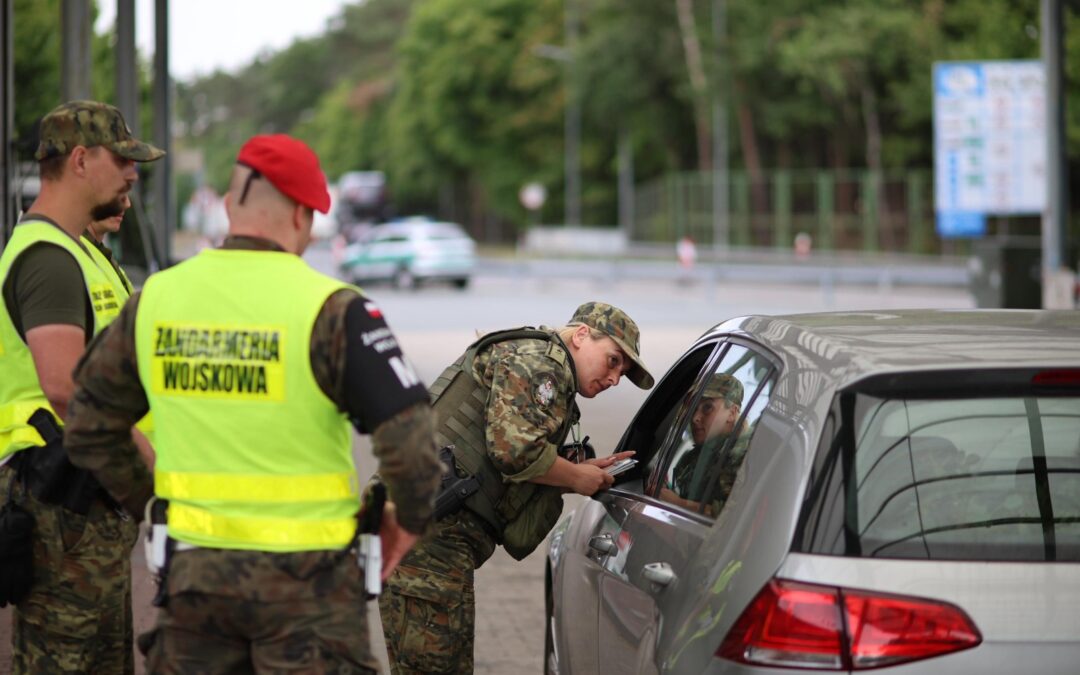Keep our news free from ads and paywalls by making a donation to support our work!

Notes from Poland is run by a small editorial team and is published by an independent, non-profit foundation that is funded through donations from our readers. We cannot do what we do without your support.
Poland has carried out checks on over 100,000 people seeking to enter from Germany and Lithuania in the first week since it restored controls on its borders with those countries. As a result, 60 people were refused entry or detained.
At midnight between Sunday 6 July and Monday 7 July, Poland reintroduced checks at its borders – initially for 30 days, though that period can be extended – in order to prevent what Prime Minister Donald Tusk called the “uncontrolled flow of migrants”.
The Lithuanian border is used as a route by migrants – mostly from Africa and Asia – who have irregularly entered Latvia and Lithuania from Belarus and then travel west through Poland.
Meanwhile, Germany – which has also had border controls in place since 2023 – has caused controversy in Poland through its policy of returning thousands of migrants who have unlawfully entered from Poland.
Poland reintroduced controls on its borders with Germany and Lithuania at midnight, with the aim of "fighting illegal migration".
Minutes later, officers announced they had detained a car transporting four irregular migrants, likely to be from Afghanistan https://t.co/3j1HnHU1vv
— Notes from Poland 🇵🇱 (@notesfrompoland) July 7, 2025
Today, a Polish border guard spokesman announced that, during the first seven days of the new restrictions, “67,000 people and 28,500 vehicles were cleared at the Polish-German border” while there were “24 refusals of entry to Poland”.
Among those prevented from entering were five foreign nationals – from Georgia, Ukraine, Brazil and Belarus – who tried to cross from Germany on Sunday without the necessary documentation, the border guard told the Polish Press Agency (PAP).
Meanwhile, on the Lithuanian border, during the first week of controls over 40,000 people and 19,500 vehicles were checked, resulting in 42 people being stopped.
The latter included 15 migrants who were directly refused entry at the border and 19 who were sent back under the so-called “readmission” procedure outlined under bilateral agreements. Eight so-called “couriers” who transport irregular migrants were also detained.
Separately, on Sunday the border guard issued a statement denying “disinformation” being spread on social media by Robert Bąkiewicz, a nationalist leader who has formed the so-called Border Defence Movement (ROG) to monitor and patrol the border with Germany.
Earlier that day, Bąkiewicz had shared a video showing what he claimed was the Polish border guard transporting a migrant from Germany into Poland. He accused the authorities of acting like a “taxi” service for migrants.
In actual fact, noted the border guard, the migrants were handed over to German police after being detained (thanks to the new border controls) while trying to illegally enter Poland from Germany.
‼️STOP DEZINFORMACJI‼️
Odnośnie filmu jaki pojawił się w mediach społecznościowych, informujemy, że nagranie przedstawia moment przekazania przez polską Straż Graniczną w ramach readmisji uproszczonej dwóch obywateli Konga Policji niemieckiej.
Zdarzenie miało miejsce w Goerlitz w… pic.twitter.com/1rCo28RKBu— Straż Graniczna (@Straz_Graniczna) July 13, 2025
A poll conducted by the Opinia24 agency and published today by broadcaster RMF shows that a majority of the Polish public, 58%, support the government’s decision to reinstall border controls.
The policy is even more popular among supporters of the national-conservative opposition Law and Justice (PiS) party, 71% of whom support it, than it is among those of Donald Tusk’s centrist Civic Platform (PO), 55% of whom are in favour.
Meanwhile, the border guard announced on Monday that migration pressure continues on Poland’s heavily fortified eastern border with Belarus, where 380 illegal crossings were attempted over the weekend.
They also noted “several instances of aggressive behaviour” towards Polish officers, which in one case resulted in a soldier being hospitalised with an eye wound caused by a clash with Afghan migrants trying to cross the border.
W trakcie ostatnich trzech dni funkcjonariusze #PodlaskiOddziałSG odnotowali blisko 380 prób nielegalnego przekroczenia polsko-białoruskiej granicy 🇵🇱🇧🇾.
Cudzoziemcy, aby przedostać się na terytorium Polski, usiłowali pokonać barierę techniczną, jak i graniczne rzeki Świsłocz,… pic.twitter.com/LqsHt521yd
— Straż Graniczna (@Straz_Graniczna) July 14, 2025

Notes from Poland is run by a small editorial team and published by an independent, non-profit foundation that is funded through donations from our readers. We cannot do what we do without your support.
Main image credit: MSWiA/X

Daniel Tilles is editor-in-chief of Notes from Poland. He has written on Polish affairs for a wide range of publications, including Foreign Policy, POLITICO Europe, EUobserver and Dziennik Gazeta Prawna.



















